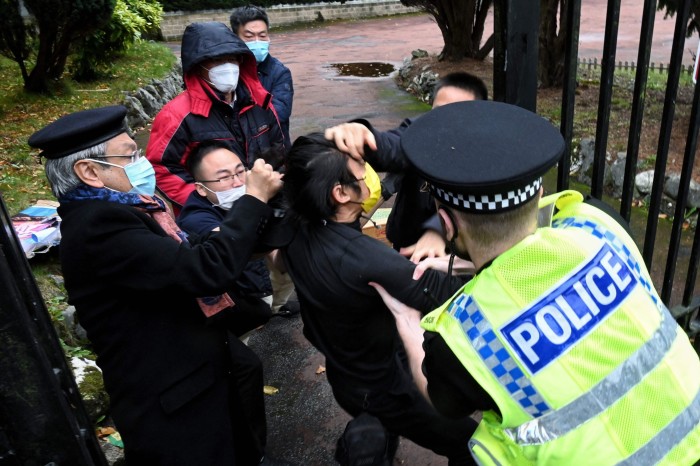Thousands of protesters gathered across European capitals in December to call for an end to China’s zero-Covid policy — and the downfall of the government that enforced it.
But in London, Berlin and other cities where demonstrations against the draconian restrictions, since dropped by Beijing, were held, nearly all protesters wore face masks — not as a Covid precaution, but to protect against the long reach of Chinese government surveillance.
“We don’t use our real names, we wear masks. We are still scared. In the end we censor ourselves,” said a Hong Kong community organiser in the UK who wished to stay anonymous out of fear of retaliation against relatives still in Hong Kong.
More than 144,000 Hong Kongers have come to the UK over the past two years as part of the government’s new British Nationals Overseas (BNO) visa programme, which was designed to help those escaping from Beijing’s crackdown on political rights. But fear of Chinese government retaliation has followed some of them.
Hong Kong’s national security law, passed in 2020, has an extra-territorial clause that criminalises supporting Hong Kong independence anywhere in the world.
“Ever since the national security law, Hong Kongers in Europe have tried not to reveal their names and identities when it comes to any engagement on Hong Kong affairs, even for cultural, non-political events,” said Iverson Ng, Estonia-based co-ordinator of the Hong Kong-Europe Diaspora Alliance.
“The fear comes because we don’t know the real impact,” he added.
Activists have spoken to the Financial Times of Hong Kong police using the clause to pursue activists in the UK and across Europe, either upon their return to Hong Kong, or by pressuring their families in the territory.
Charlie, a young Hong Konger using a pseudonym, spoke at a rally in Glasgow in support of democracy in Hong Kong, and attended another protest in Manchester in 2022.
A month after his return to Hong Kong in 2022, police called him to Mong Kok police station. They then identified themselves as being from the national security office and presented him with photos of his face in protests that had not appeared online. He suspected they were taken by someone in the UK working with the Hong Kong police.
“You took part in demonstrations and gave speeches in foreign countries, which is enough to constitute terrorist activities,” the police told him before releasing him without a formal bail note. He left Hong Kong soon after.
Simon Cheng, founder of the community organisation Hongkongers in Britain, said the group had heard of about 10 cases in which Hong Kongers were pressured by police upon returning to the territory for political activities abroad, and even more cases where relatives back home had been harassed. Very few are willing to speak in public, even anonymously, about their experiences.
“The police question them about which activists and organisations they’ve met while abroad. They consider the crime of ‘collusion with foreign forces’ to include meeting with any groups they consider anti-China, not just foreign governments,” said Cheng.
Hong Kongers in Britain presented an example of extra-territorial surveillance in a submission to the UN Human Rights Committee’s regular civil rights review last year. The committee called on China to repeal the national security law, saying it was “deeply concerned about the overly broad interpretation . . . and arbitrary application of the law”.
Veteran activists say that, while many protesters — as well as journalists and passers-by, photograph demonstrations — they have developed a feel for malicious surveillance, which often involves photographers putting cameras in protesters’ faces and zooming in on details.
“After you’ve been to several protests, you develop a sense of how to distinguish suspicious people. They’re not participating, if someone approaches them, they’re either not willing to speak, or speak Cantonese badly, or Mandarin,” said Ray Wong, chair of the German NGO Freedom for Hong Kong (Freiheit für Hong Kong), who has been filmed at protests in Berlin and Göttingen.
The identities of those doing the filming is usually unclear. Activists suspect that some are organised by the Chinese government via local embassies, while some may be nationalistic volunteers acting on their own initiative.

Some activists have also been followed. After taking a group of Hong Kong students to meet German parliamentarians in 2019, Wong noticed they were being followed by two people. “They even took out their phones to take photos of us while we were eating in a restaurant,” said Wong. The following year, he was tailed while meeting another activist in London.
“They are being obvious, not trying to hide — that’s a common tactic used to pressure dissidents, to tell you that you are being watched,” Wong said, adding that the same methods were used by security agents in Hong Kong.
Despite the pressure, activists are continuing to organise events with local civil society groups, including others affected by transnational repression.
“There’s a lot of room for learning between various groups that have encountered Chinese government harassment — Hong Kongers, Uyghurs, Tibetans,” said Nicola Macbean, founder of NGO The Rights Practice, who convened a civil society forum on Chinese government transnational repression.
“Some, like the Tibetans, have been through this kind of pressure for years. Over time they’ve created a strong community that can resist,” Macbean added.
Governments are also beginning to work out effective responses to the surveillance. Andrew Chubb, a researcher at Lancaster University, advocates for the establishment of a “Transnational Rights Protection Office” inside the UK’s Equality and Human Rights Commission, partly to defuse victims’ fears of retaliation for engaging with government security agencies.
In the wake of the assault of a Hong Kong protester inside the Chinese consulate in Manchester in October, British parliamentarians across the party spectrum have called for more action to stop the Beijing government interfering with freedom of assembly and speech in the UK.
“We owe a duty to Hong Kongers to make sure they’re protected. They’re leaving Hong Kong because of suppression, and that suppression should not be chasing them here to Britain,” said Afzal Khan, MP for Manchester Gorton, where the assault took place.
In November British security minister Tom Tugendhat chaired the first meeting of the Defending Democracy Taskforce, a new unit working across government and the intelligence agencies to tackle what the minister described as “growing and changing” state threats in the UK.
“I am committed to tackling transnational repression wherever it is,” he added.
The Chinese embassy in London referred the FT to a previous statement, saying that “no one is above the law by using freedom as the excuse, and those who violate the law must be held accountable”.
Nathan Law, one of Hong Kong’s most prominent former lawmakers who is now living in exile in London, believes that pro-Chinese Communist party groups in the UK have already become more low-key, possibly in response to London’s signalling of a more hawkish relationship with Beijing. He said pro-CCP counter-protests at Hong Kong independence rallies in 2019 were once common but had faded.
“The [UK] government’s attitude is very important in sending out a warning,” said Law. “We need to show that if there’s evidence of collusion with the national security police, people will be investigated.”














